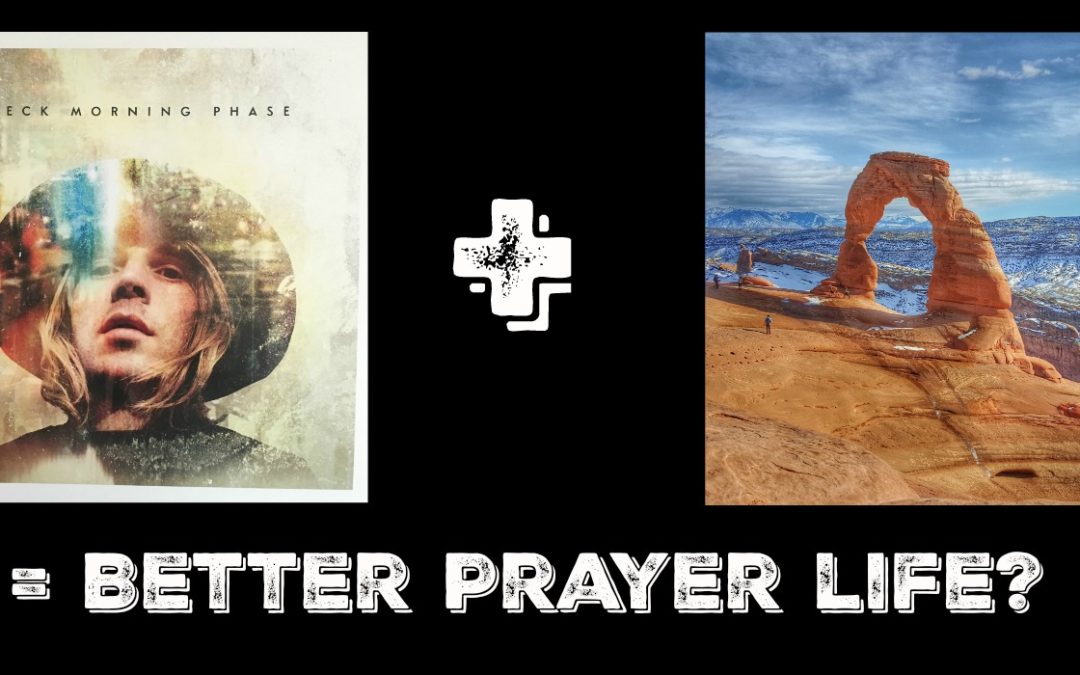 At Rocking God’s House our vision is to help Christians use creative thinking tools to see the beauty of Christ more often and more vividly in their lives–in the physical world around them, in their relationships, churches, and jobs, and in the sorrows and joys of life. The creative topics of entertainment and culture provide launch points for this grand treasure hunt.
At Rocking God’s House our vision is to help Christians use creative thinking tools to see the beauty of Christ more often and more vividly in their lives–in the physical world around them, in their relationships, churches, and jobs, and in the sorrows and joys of life. The creative topics of entertainment and culture provide launch points for this grand treasure hunt.
Today’s creative thinking tool: finding unusual connections between things that seem to have nothing in common.
Today’s problem: how can I pray better?

Shop for Morning Phase
The two seemingly unalike things that we’ll use to help solve this problem: 1) The album Morning Phase by Beck and 2) Arches National Park in Utah.
It began with a road trip. Sometimes God uses the strangest things.
I never expected the experience would help unlock the astonishing implications of the first four words of the Lord’s prayer.
As my car passed near Moab and Arches National Park, canyon walls as huge as ocean reefs towered over me. I saw fiery orange terraces and plateaus surrounding me on every side.
And then the album “Morning Phase” by Beck began playing over my stereo. Although Beck’s music is not Christian music, I have long appreciated his creativity. With a slow fade-in–a warm, blooming gradient of orchestral strings and processed synth pads–the music rose over my head as majestically as the sandstone rocks.
As the album played (which, by the way, is an utter masterpiece of composition, production, and tone color that has provoked some critics to say it is a once-in-a-lifetime work of genius) the songs began to float and weave around me with the same sublime architecture as the long, towering sandstone reefs and rocks.
The word “sublime” is key.
The Utah landscape and the music filled me with an overwhelming sense of the sublime.
Sublime: of such excellence, grandeur, or beauty as to inspire great admiration or even fear.
A sublime emotion is what you feel when you see something so wondrous in its magnitude that your awe borders on terror or perhaps a quiet, fearful reverence. For example, if you are a storm chaser, you are fascinated by cloud and wind movements, and you think storms have a magnificent beauty to them. But when you see a tornado on the horizon–not threatening you, yet, but there in plain sight–your awe has a reverential, healthy fear in it.
The sublime sandstone rock formations and songs became point-markers to God and metaphors for certain traits–i.e. especially for His untamable, unquenchable power.
As Job 37:1-3 says:
At this my heart pounds
and leaps from its place.
Listen! Listen to the roar of his voice,
to the rumbling that comes from his mouth.
He unleashes his lightning beneath the whole heaven
and sends it to the ends of the earth.
But then, without warning, the landscape–both the Utah desert terrain and the soundscape of “Morning Phase”–shifted as we drove. The rocks flattened into a serene horizon, and the music changed into a more intimate, easy-going acoustic guitar–folk-like fingerpicking and subdued singing replaced the huge sweeps of cavernous space and melodic arches.
The music became gentle, kind and up-close like a loved one chatting with you in your car or a pleasant summer afternoon in a small town. The Utah landscape mellowed. There was no fear anymore. Just a pleasant intimacy.
So what does this have to do with prayer?
This shift from the sublime to the gentle provides a blueprint for how we can start every time of prayer and communion with God.
I’ll explain what I mean by using the first four words in the Lord’s prayer as an example: “Our Father in Heaven.”
Those short phrase contains everything discussed above. It contains the truth that God is in Heaven–that He is the uncaused cause of all creation, and that from His throne in Heaven all rivers of time and plains of eternity surround Him and are at his command. Those two words “in Heaven,” if we really stop to mediate on them, remind us of the awe-inspiring power and eternal rule of God. This also reminds us that He, in His perfection, is also a righteous judge, and we are all accountable to Him.
But then the other two words “Our Father” suddenly change the terrain. We swing from the sublime–and the reverential fear and wonder–to a comforting reality that this awe-inspiring God of unimaginable power has chosen to adopt us into His family through grace.
He has chosen to be our Father. He is family. He is the near voice speaking to us with kindness like the loved one sitting next to us in the car sharing their thoughts.
Those two words “Our Father” bring us into that intimacy with God, and the more we think about it, the more His love surrounds us and becomes experiential to the heart.
Timothy Keller and others have talked about this crucial dichotomy to the prayer life. Keller described it as pendulum. We begin our prayer times with this two-fold admiration, and we swing back and forth between deep reverence of God’s awesomeness to deep gratitude for His grace and intimacy that He’s made possible. And each time we swing between the two, the swing gets wider and faster.
It builds exponentially.
The more you appreciate His nearness and love, the more you will value His awesome power and perfect judgment. The more you fall on your knees in reverential respect before His awesome power, the more gratitude you will feel when you turn and remember His grace and nearness.
If you begin each prayer time with this kind of two-fold adoration–from sublime awe to intimate nearness back to sublime awe again (like the shifting landscapes of Arches National Park and soundscapes of “Morning Phase”)–it will absolutely transform the way you experience everything else that follows in your communion with Him: from your needs and requests to your confessions to your spiritual warfare against the enemy. It will change your life.
It’s like a spiral staircase that winds up and up and gets wider with every turn. The more you move back and forth between these two revelations about God, the higher and grander the spiral staircase goes–like a helix of life, like DNA, spinning upwards forever, never finding an end to the glory of God.




What a wonderful painting of words that really bring life if utilized in our prayer life. Thank you for this picture of prayer. I will start to use it in my prayer life.